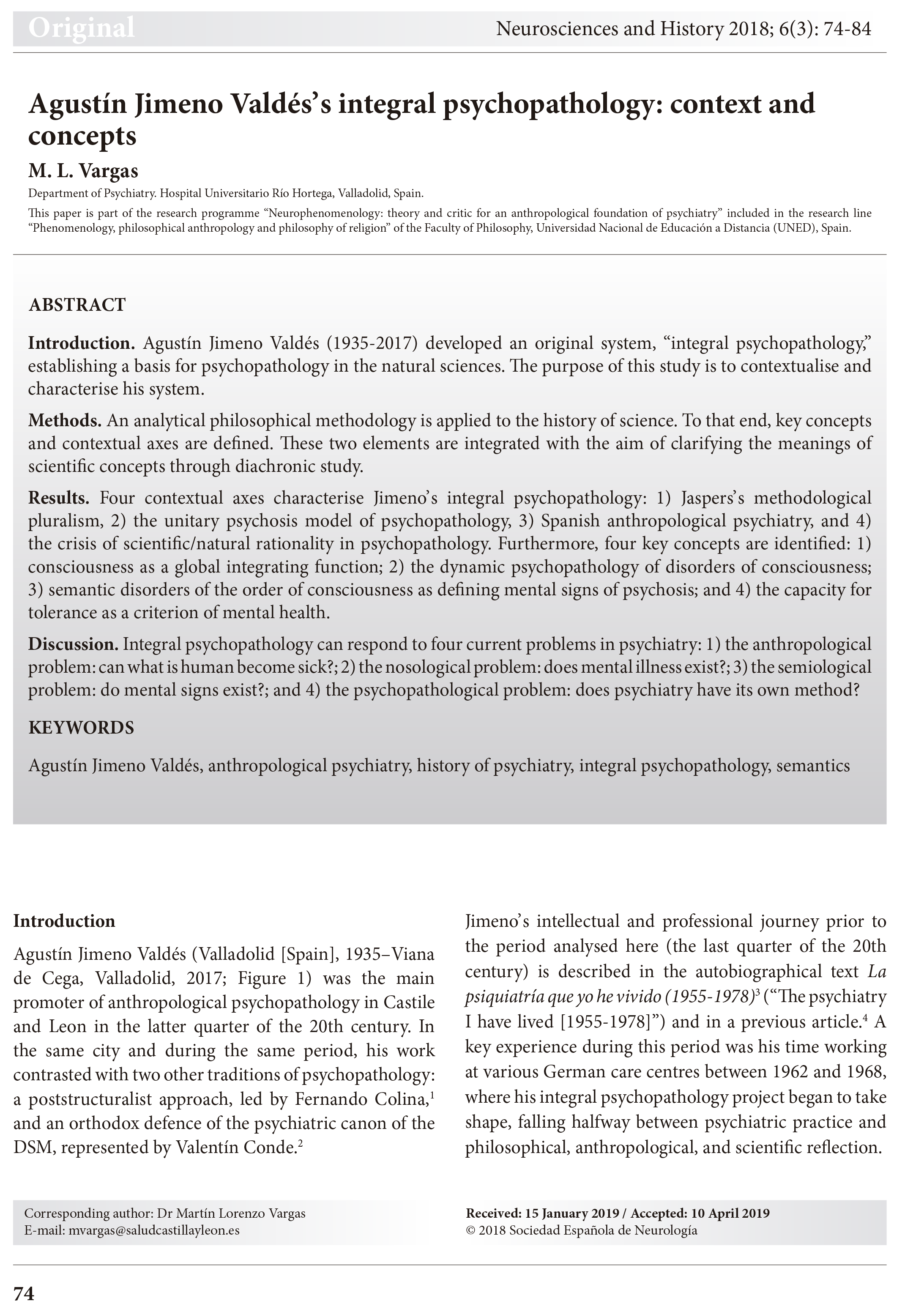
Volume 12
Num. 1 | January-March 2024
Num. 2 | April-June 2024
Num. 3 | July-September 2024
Num. 4 | October-December 2024

Volume 11
Num. 1 | January-March 2023
Num. 2 | April-June 2023
Num. 3 | July-September 2023
Num. 3 | October-December 2023

Volume 10
Num. 1 | January-March 2022
Num. 2 | April-June 2022
Num. 3 | July-September 2022
Num. 4 | October-December 2022
Available Now!
Issue 4 of Neurosciences and History is now available. Don’t miss the opportunity to read our latest research articles on the history of neurology.
Browse Volume 12Issue 4 belongs to Volume 12, 2024.
Browse volumes and issues in the “latest issues” section

Guardar
Guardar
Agustín Jimeno Valdés’ s integral psychopathology: context and concepts
 M. L. Vargas
M. L. VargasNeurosciences and History 2018; 6(3): 74-84
Type of article: ORIGINAL
AUTHOR
M. L. Vargas
Department of Psychiatry. Hospital Universitario Río Hortega, Valladolid, Spain.
This paper is part of the research programme “Neurophenomenology: theory and critic for an anthropological foundation of psychiatry” included in the research line “Phenomenology, philosophical anthropology and philosophy of religion” of the Faculty of Philosophy, Universidad Nacional de Educación a Distancia (UNED), Spain.
ABSTRACT
Introduction. Agustín Jimeno Valdés (1935-2017) developed an original system, “integral psychopathology,” establishing a basis for psychopathology in the natural sciences. The purpose of this study is to contextualise and characterise his system.
Methods. An analytical philosophical methodology is applied to the history of science. To that end, key concepts and contextual axes are defined. These two elements are integrated with the aim of clarifying the meanings of scientific concepts through diachronic study.
Results. Four contextual axes characterise Jimeno’ s integral psychopathology: 1) Jaspers’ s methodological pluralism, 2) the unitary psychosis model of psychopathology, 3) Spanish anthropological psychiatry, and 4) the crisis of scientific/natural rationality in psychopathology. Furthermore, four key concepts are identified: 1) consciousness as a global integrating function; 2) the dynamic psychopathology of disorders of consciousness; 3) semantic disorders of the order of consciousness as defining mental signs of psychosis; and 4) the capacity for tolerance as a criterion of mental health.
Discussion. Integral psychopathology can respond to four current problems in psychiatry: 1) the anthropological problem: can what is human become sick?; 2) the nosological problem: does mental illness exist?; 3) the semiological problem: do mental signs exist?; and 4) the psychopathological problem: does psychiatry have its own method?
KEYWORDS
Agustín Jimeno Valdés, anthropological psychiatry, history of psychiatry, integral psychopathology, semantics
Neurosciences and History 2018; 6(3): 74-84
Editorial Secretary
Neurosciences and History
Archivo Histórico de la Sociedad Española de Neurología
C/ Casp, 172, 1A 08013 – Barcelona
Tlf.: +34 933426233.
E-mail: archivo@sen.org.es







